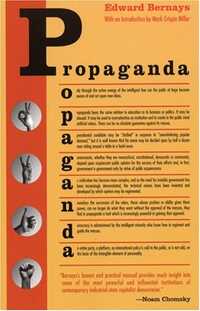
Propaganda
Chapter 7
Women's Activities and Propaganda
- Author :: Edward Bernays
- Publication Year :: 1928
- Posted: August 4, 2024
Important
Very important
Chapter 07 - Women’s Activities and Propaganda
page 109:
-
WOMEN in contemporary America have achieved a legal equality with men. This does not mean that their activities are identical with those of men. Women in the mass still have special interests and activities in addition to their economic pursuits and vocational interests.
-
I find it interesting that 100 years ago Bernays is claiming (and I agree) women have legal equality with men. Yet, today we constantly hear a subset of women, feminists, decrying the patriarchy and how they lack some rights (that they can never give examples of).
-
Women’s most obvious influence is exerted when they are organized and armed with the weapon of propaganda.
-
In politics, the American women to-day occupy a much more important position, from the standpoint of their influence, in their organized groups than from the standpoint of the leadership they have acquired in actual political positions or in actual office holding. The professional woman politician has had, up to the present, not much influence, nor do women generally regard her as being the most important element in question. Ma Ferguson, after all, was simply a woman in the home, a catspaw for a deposed husband; Nellie Ross, the former Governor of Wyoming, is from all accounts hardly a leader of statesmanship or public opinion.
-
This is obviously not the case today. There are many women professional politicians.
page 110:
-
If the suffrage campaign did nothing more, it showed the possibilities of propaganda to achieve certain ends. This propaganda to-day is being utilized by women to achieve their programs in Washington and in the states.
-
In Washington they are organized as the Legislative Committee of Fourteen Women’s Organizations, including the League of Women Voters, the Young Women’s Christian Association, the Woman’s Christian Temperance Union, the Federation of Women’s Clubs, etc. These organizations map out a legislative program and then use the modern technique of propaganda to make this legislative program actually pass into the law of the land. Their accomplishments in the field are various. They can justifiably take the credit for much welfare legislation. The eight-hour day for women is theirs. Undoubtedly prohibition and its enforcement are theirs, if they can be considered an accomplishment. So is the Shepard-Towner Bill which stipulates support by the central government of maternity welfare in the state governments. This bill would not have passed had it not been for the political prescience and sagacity of women like Mrs. Vanderlip and Mrs. Mitchell.
-
Women’s organizations had so much influence that, at least according to Bernays, they were responsible for prohibition. I’ll refrain from making a comment on the abject failure that was.
page 111:
-
The Federal measures endorsed at the first convention of the National League of Women Voters typify social welfare activities of women’s organizations. These covered such broad interests as child welfare, education, the home and high prices, women in gainful occupations, public health and morals, independent citizenship for married women, and others.
-
If I have seemed to concentrate on the accomplishments of women in politics, it is because they afford a particularly striking example of intelligent use of the new propaganda to secure attention and acceptance of minority ideas. It is perhaps curiously appropriate that the latest recruits to the political arena should recognize and make use of the newest weapons of persuasion to offset any lack of experience with what is somewhat euphemistically termed practical politics.
page 112:
-
In the General Federation of Women’s Clubs, there are 13,000 clubs. Broadly classified, they include civic and city clubs, mothers’ and homemakers’ clubs, cultural clubs devoted to art, music or literature, business and professional women’s clubs, and general women’s clubs, which may embrace either civic or community phases, or combine some of the other activities listed.
-
This book was published in 1928. Women’s suffrage in the USA was passed in 1920. While these clubs probably existed before suffrage, it shows that women always (or at least for over 100 years) had a place and an important role to play, contrary to what the modern day feminists might claim.
page 113:
-
A club interested principally in homemaking and the practical arts can sponsor a cooking school for young brides and others. An example of the keen interest of women in this field of education is the cooking school recently conducted by the New York Herald Tribune, which held its classes in Carnegie Hall, seating almost 3,000 persons. For the several days of the cooking school, the hall was filled to capacity, rivaling the drawing power of a McCormack or a Paderewski, and refuting most dramatically the idea that women in large cities are not interested in housewifery.
-
Even after suffrage apparently quite a few young women were still interested in learning to cook and “housewifery”. Interesting that Bernays uses the “housewife” here where at the beginning of the paragraph he uses “homemaking”. I think that “housewife” is in and of itself a propaganda term. It makes one think that the women is nothing more than a wife - she belongs to her husband - and that she remains in the house. It is also remnant of housenigger. The term “homemaker” is much more positive. She is making a home.
page 114:
-
Over and above the particular object for which the woman’s club may have been constituted, it commonly stands ready to initiate or help any movement which has for its object a distinct public good in the community. More important, it constitutes an organized channel through which women can make themselves felt as a definite part of public opinion.
-
Just as women supplement men in private life, so they will supplement men in public life by concentrating their organized efforts on those objects which men are likely to ignore. There is a tremendous field for women as active protagonists of new ideas and new methods of political and social housekeeping. When organized and conscious of their power to influence their surroundings, women can use their newly acquired freedom in a great many ways to mold the world into a better place to live in.
-
I suspect many modern day feminists would take offense at saying “women supplement men”, but I would argue that it is both true and equally cuts the other direction (men supplement women). I like to say that men and women are 2 sides of the same coin. You need both for either to be at their best to have a functioning society and for raising children.
-
I can certainly agree that women used their freedom to mold the world, but I can certainly disagree that it has made the world better.




